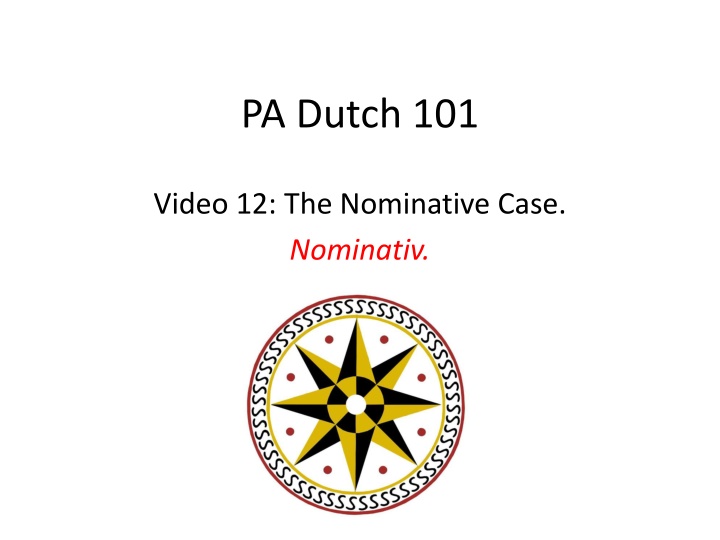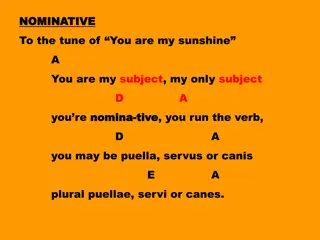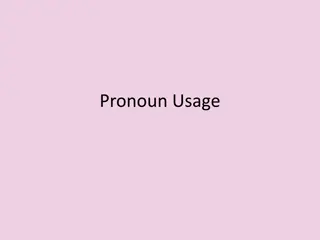
The Nominative Case in Pennsylvania Dutch
Explore the Nominative Case in Pennsylvania Dutch, where nouns have assigned genders and definite articles vary based on gender. Learn about pitfalls to avoid and practice exercises to enhance your understanding of gender and case in PD.
Download Presentation

Please find below an Image/Link to download the presentation.
The content on the website is provided AS IS for your information and personal use only. It may not be sold, licensed, or shared on other websites without obtaining consent from the author. If you encounter any issues during the download, it is possible that the publisher has removed the file from their server.
You are allowed to download the files provided on this website for personal or commercial use, subject to the condition that they are used lawfully. All files are the property of their respective owners.
The content on the website is provided AS IS for your information and personal use only. It may not be sold, licensed, or shared on other websites without obtaining consent from the author.
E N D
Presentation Transcript
PA Dutch 101 Video 12: The Nominative Case. Nominativ.
The Nominative Case The Nominative Case refers to the Subject of a sentence. Other nouns in a sentence take different cases, these will be discussed in future videos. All nouns in PD have an assigned Gender. This is very different from English. Genders do not make sense to most English speakers. Therefore, when learning new vocabulary, always memorize the gender as well as the PD word.
The Definite Article (THE) In English we have one way to say the word THE, in PD, there are multiple forms! In the Nominative Case, we use the following definite articles: Masculine Feminine der Neuter es Plural die die
A Pitfall Given the fact that all nouns have a gender in PD, it is vital that you learn the gender when you learn a new word. When looking up a word in a dictionary you will see something like this: Book Buch, n The little n, signifies that Buch is a neuter noun. So in a sentence, the book = es Buch. Nouns are not necessarily masculine, feminine or neuter by nature! All nouns are always Capitalized!
The Indefinite Article (A/AN) The Indefinite Article does not specifically identify the noun that they are associated with. The book. vs. A book. Masculine Feminine en Neuter en Plural en
Iewing - Practice ____ (the) Bu (m) iss datt driwwe. Der Bu iss datt driwwe. ____ (the) Fraa (f) wuhnt in Ellsdaun. Die Fraa wuhnt in Ellsdaun. ____ (the) Schof (n) iss weiss. Es Schof iss weiss. ____ (a) Fenschder (n) iss gebroche. En Fenschder iss gebroche.
Eppes nooch! Gender and Case often frustrate learners. Hang in there and keep practicing! LEARN GENDERS WHEN YOU LEARN NEW VOCABULARY!
Bis die naegschde Video, Macht s gut un schwetzt Deitsch! E-Poscht schreiwe: busterpa@yahoo.com






















